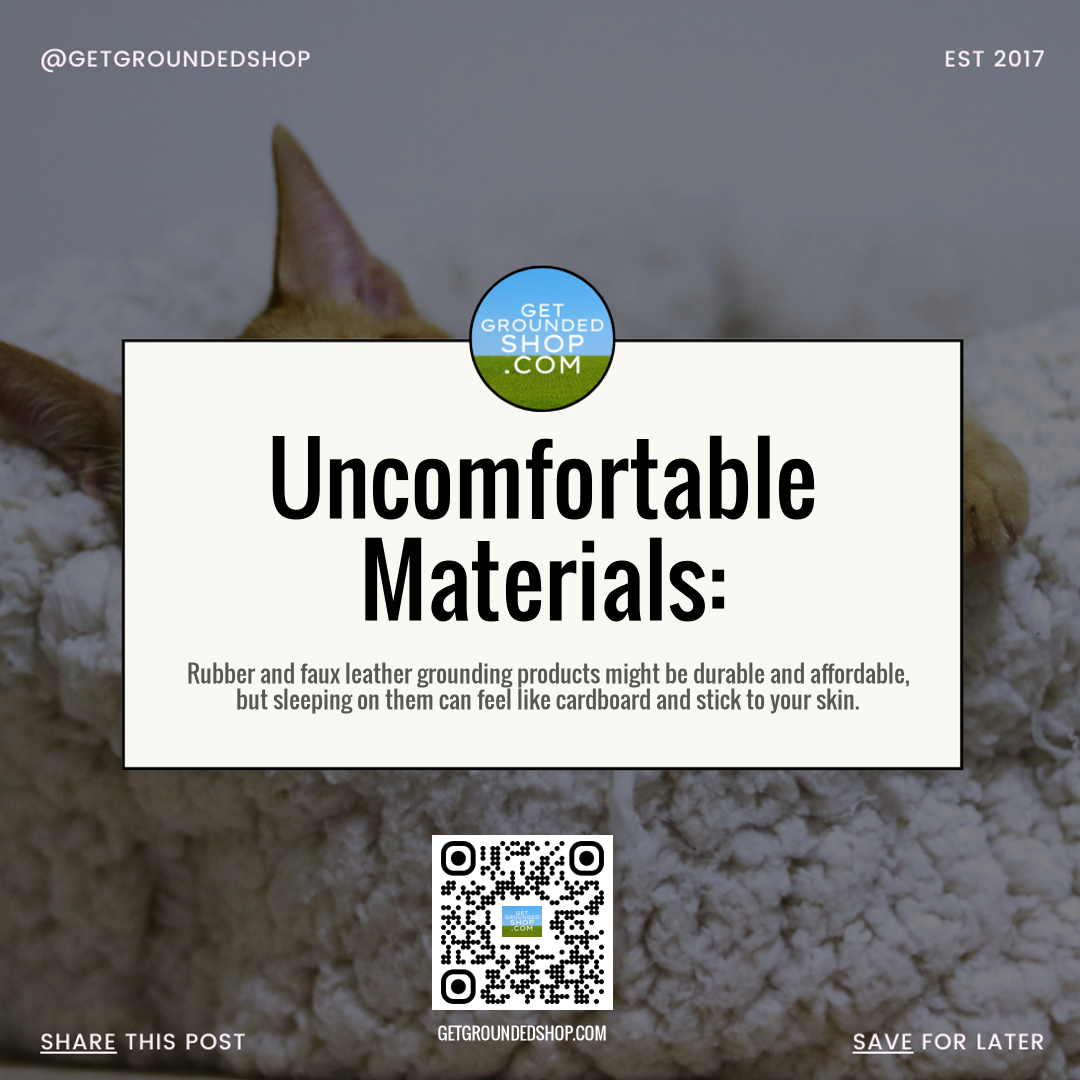
Uncomfortable Materials: The Hidden Costs of Rubber and Faux Leather Grounding Products
If you’ve been exploring grounding products, you may have come across a variety of options, including rubber and faux leather. These materials are often marketed as durable, affordable, and easy to maintain. However, there’s an uncomfortable truth lurking beneath their surface: sleeping on these products can feel like resting on cardboard while the material clings to your skin. In this blog post, we will delve into the discomforts associated with these materials and explore more comfortable alternatives for your grounding needs.
The Appeal of Rubber and Faux Leather
Rubber and faux leather are commonly used in grounding mats, sheets, and other products due to their affordability and durability. They are designed to withstand wear and tear, making them an attractive choice for many consumers. Additionally, these materials are often marketed as being easy to clean and maintain, which adds to their appeal in a busy household.
However, the very qualities that make rubber and faux leather popular can also lead to significant discomfort. The texture of rubber, while sturdy, lacks the softness and breathability that many people seek in bedding and other sleep-related products. Similarly, faux leather can become sticky against the skin, especially in warmer temperatures or during the night, leading to restless sleep and irritation.
The Discomfort Factor
Imagine settling into bed after a long day, only to find that your grounding mat feels more like a piece of cardboard than a cozy bed. This is the reality for many users of rubber and faux leather grounding products. The rigid texture can create pressure points on the body, making it difficult to achieve a restful night's sleep.
Moreover, the stickiness of faux leather can exacerbate discomfort, causing you to wake up feeling clammy or overheated. This can be particularly problematic for individuals who are sensitive to temperature changes or who tend to sweat at night. As a result, what should be a restorative experience turns into a battle against an uncomfortable surface.
Health Considerations
In addition to the physical discomforts, there are potential health considerations associated with sleeping on rubber and faux leather. Many of these materials are treated with chemicals that can off-gas into your sleeping environment. This can lead to exposure to volatile organic compounds (VOCs), which may contribute to respiratory issues or allergic reactions for some individuals.
Choosing grounding products made from natural and breathable materials can help mitigate these risks. Organic cotton, linen, or certified natural rubber are excellent alternatives that not only provide comfort but also promote a healthier sleeping environment. For more insights on selecting high-quality grounding products, check out the article on Top Grounding Products for Ultimate Wellness Experience.
Comfortable Alternatives for Grounding Products
If you’re seeking grounding solutions without the discomfort of rubber and faux leather, consider the following alternatives:
1. Organic Cotton Grounding Sheets
Organic cotton is soft, breathable, and hypoallergenic, making it an ideal choice for grounding sheets. These sheets allow for air circulation, reducing the likelihood of overheating while providing a comfortable surface to sleep on. Learn more about the science and benefits of authentic grounding sheets in this informative article: The Science and Benefits of Authentic Grounding Sheets.
2. Natural Rubber Mats
For those who prefer mat-based grounding solutions, natural rubber mats offer a durable yet comfortable alternative. Unlike synthetic rubbers, natural rubber is sourced from the sap of rubber trees and is free of harsh chemicals, making it a safer option for prolonged contact with the skin.
3. Linen Grounding Products
Linen is another natural fabric that excels in comfort. Its moisture-wicking properties help regulate body temperature, ensuring you stay cool and dry throughout the night. Linen grounding products can provide both the grounding benefits and the comfort you need for a good night's sleep.
Conclusion
While rubber and faux leather grounding products may seem appealing due to their cost-effectiveness and durability, the discomfort they can cause should not be overlooked. Sleeping on surfaces that feel like cardboard or that stick to your skin can severely impact your sleep quality and overall well-being. By opting for more comfortable alternatives like organic cotton, natural rubber, or linen, you can enjoy the grounding benefits without sacrificing comfort. For a comparison between different grounding products, see the post on Grounding Mats Vs. Grounding Bedsheets. Prioritize your sleep and well-being by choosing materials that support a restful and rejuvenating night.